6 oct 2019
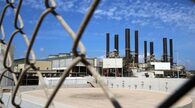
Palestinian MP Jamal Al-Khodari said Friday that 100 per cent of Gaza factories have been completely or at least partially destroyed and put out of business due to the Israeli siege and repeated aggressions that have been going on for the last 12 years.
In his statement, Al-Khodari clarified that hundreds of shops and factory units have shut down over the last years, pushing the povery rate to 85% and the unemployment rate to a staggering 60%.
In a previous statement, the MP, who is also the head of the Popular Committee against the Siege on Gaza, explained that about 3500 factories had already closed their books because of the continuous violence.
The Israeli occupation is still imposing restrictions on Gazan imports and exports and according to Al-Khodari, who was also an academic and a businessman, the direct loss to Gaza’s economy because of these measures amounts to about $ 70 million each month.
He concluded his statement by calling on the world to put pressure on the Israeli occupation in order to lift the siege. This would be the solution to ending the suffering of the Gazan citizens.
Worst humanitarian situation since 2007
According to a report published early last month by the Gaza Aid Association in Istanbul, the situation in Gaza is currently “the worst over the years of siege”. Additionally, the blockaded strip has registered the highest tragic humanitarian figures in the world.
The numbers in said report marked an unemployment rate of 52% (now 60%), a poverty rate of 53% (now 85%), a water pollution rate of 95% and a daily power outage rate of approximately 75%.
Furthermore, the rate of medicine shortage touches 50%, the lack of medical supplies is 27% and the amount of homes destroyed or damaged by Israeli assaults reaches as high as 77%, leaving thousands of families homeless or displaced.
With these numbers still on the rise, the UN estimates that by 2020, the Gaza Strip will no longer be liveable.
In his statement, Al-Khodari clarified that hundreds of shops and factory units have shut down over the last years, pushing the povery rate to 85% and the unemployment rate to a staggering 60%.
In a previous statement, the MP, who is also the head of the Popular Committee against the Siege on Gaza, explained that about 3500 factories had already closed their books because of the continuous violence.
The Israeli occupation is still imposing restrictions on Gazan imports and exports and according to Al-Khodari, who was also an academic and a businessman, the direct loss to Gaza’s economy because of these measures amounts to about $ 70 million each month.
He concluded his statement by calling on the world to put pressure on the Israeli occupation in order to lift the siege. This would be the solution to ending the suffering of the Gazan citizens.
Worst humanitarian situation since 2007
According to a report published early last month by the Gaza Aid Association in Istanbul, the situation in Gaza is currently “the worst over the years of siege”. Additionally, the blockaded strip has registered the highest tragic humanitarian figures in the world.
The numbers in said report marked an unemployment rate of 52% (now 60%), a poverty rate of 53% (now 85%), a water pollution rate of 95% and a daily power outage rate of approximately 75%.
Furthermore, the rate of medicine shortage touches 50%, the lack of medical supplies is 27% and the amount of homes destroyed or damaged by Israeli assaults reaches as high as 77%, leaving thousands of families homeless or displaced.
With these numbers still on the rise, the UN estimates that by 2020, the Gaza Strip will no longer be liveable.
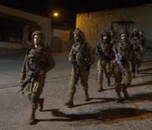
Israeli soldiers abducted, Sunday, ten Palestinians including a child, from their homes in several parts of the occupied West Bank, including occupied East Jerusalem, and confiscated surveillance recordings and equipment in Hebron.
The Hebron office of the Palestinian Prisoners’ Society (PPS), in southern West Bank, said the soldiers invaded and ransacked homes in several parts of the governorate, and abducted five Palestinians, identified as Ahmad Khader al-Hroub, Zayed Ali Khdeirat, Kayed al-Amayra, Karim Ibrahim Abu Mariya, and Ahmad Sleibi.
It is worth mentioning that the soldiers repeatedly assaulted Ahmad Sleibi, and his brother, Ra’fat, before abducting Ahmad.
The soldiers also confiscated surveillance recordings and equipment from homes and shops in Hebron.
In Azzoun town, east of the northern West Bank city of Qalqilia, the soldiers searched homes and abducted three Palestinians, identified as Ala’ Assem Mansour, 24, Samer Sa’id Radwan, 18, and Moath Islam Radwan, 20.
In Tulkarem, in northern West Bank, the soldiers abducted a child, identified as Mos’ab Abdul-Qader Abu ash-Shawareb, 14, from his home.
In Occupied Jerusalem, the soldiers abducted Mo’men al-Hasheem, 19, from his home in Bab Hotta, and summoned Ayham Sharifa, 18, in addition to Amjad Abu Sneina, 23, for interrogation.
The Hebron office of the Palestinian Prisoners’ Society (PPS), in southern West Bank, said the soldiers invaded and ransacked homes in several parts of the governorate, and abducted five Palestinians, identified as Ahmad Khader al-Hroub, Zayed Ali Khdeirat, Kayed al-Amayra, Karim Ibrahim Abu Mariya, and Ahmad Sleibi.
It is worth mentioning that the soldiers repeatedly assaulted Ahmad Sleibi, and his brother, Ra’fat, before abducting Ahmad.
The soldiers also confiscated surveillance recordings and equipment from homes and shops in Hebron.
In Azzoun town, east of the northern West Bank city of Qalqilia, the soldiers searched homes and abducted three Palestinians, identified as Ala’ Assem Mansour, 24, Samer Sa’id Radwan, 18, and Moath Islam Radwan, 20.
In Tulkarem, in northern West Bank, the soldiers abducted a child, identified as Mos’ab Abdul-Qader Abu ash-Shawareb, 14, from his home.
In Occupied Jerusalem, the soldiers abducted Mo’men al-Hasheem, 19, from his home in Bab Hotta, and summoned Ayham Sharifa, 18, in addition to Amjad Abu Sneina, 23, for interrogation.
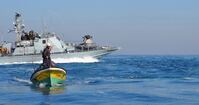
The Israeli occupation forces (IOF) on Sunday morning opened machinegun fire at Palestinian farmers and fishermen in the east and west of the Gaza Strip.
According to local sources, Israeli gunboats chased fishing boats and opened fire at them off the shores of al-Waha and as-Sudaniya areas in the northwest of Gaza.
In the east of Gaza, the IOF opened fire at Palestinian agricultural areas, farmers’ homes and shepherds in Khan Younis, Deir al-Balah and Gaza City.
According to local sources, Israeli gunboats chased fishing boats and opened fire at them off the shores of al-Waha and as-Sudaniya areas in the northwest of Gaza.
In the east of Gaza, the IOF opened fire at Palestinian agricultural areas, farmers’ homes and shepherds in Khan Younis, Deir al-Balah and Gaza City.
5 oct 2019
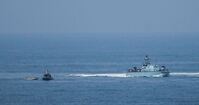
The Israeli occupation navy on Saturday morning opened fire at Palestinian fishermen sailing off the coast of Gaza City.
Safa news agency said, quoting eyewitnesses, that Israeli gunboats heavily opened fire at Palestinian fishermen who were working within the permitted area, but no injuries were reported.
The Israeli occupation navy on a regular basis attacks Palestinian fishermen in Gaza in a blatant violation of the ceasefire agreement signed between the Palestinian resistance groups in Gaza and Israel under the auspices of Egypt in 2014.
Safa news agency said, quoting eyewitnesses, that Israeli gunboats heavily opened fire at Palestinian fishermen who were working within the permitted area, but no injuries were reported.
The Israeli occupation navy on a regular basis attacks Palestinian fishermen in Gaza in a blatant violation of the ceasefire agreement signed between the Palestinian resistance groups in Gaza and Israel under the auspices of Egypt in 2014.
4 oct 2019

Chairman of the General Authority of Civil Affairs, Hussein Sheikh, said today that an agreement was reached with the Israeli Minister of Finance, Moshe Kahlon, under which Israel will return part of millions of dollars in Palestinian tax revenues, which Israel has been withholding for nearly eight months.
He said despite the agreement, disputes continue to persist over Israel’s withholding of the amount paid monthly by the Palestinian government to the detainees in Israeli jails and the families of those killed by Israeli forces.
Sheikh added that a set of outstanding issues were discussed during the meeting with the Israeli Finance Minister, and that both sides agreed on activating joint committees to look into all issues as of next Sunday.
Earlier this year, Israel began withholding some of the $200m in monthly tax transfers that the Palestinian government pays to families of people killed or imprisoned by Israel.
The funds withheld are approximately five percent of the total collected on behalf of the PA, but the Palestinians in protest refused to accept any tax revenues from Israel.
Israel To Release 1.8 Billion Of Held Palestinian Money
Following a Thursday meeting between the Israeli Finance Minister Moshe Kahlon and his Palestinian counterpart Hussein Sheikh, the former stated that Israel will be transferring 1.8 Billion Shekels from the Palestinian tax money Israel has been withholding and refusing to transfer.
Israeli TV Channel 13 said the money is part of 3 Billion Shekels Israel is refusing to transfer to the Palestinian Authority to pressure it into stopping the salaries and pensions paid to families of Palestinians who were killed by the army, the wounded and the political prisoners.
Although Israel still insists on stopping these payments, Kahlon agreed on the transfer of the 1.8 Billion Shekels, after the Palestinian side refused the Israeli interference in internal affairs, and the necessity of these payments to support the bereaved families, the wounded and the detainees, in addition to providing assistance to needy families.
Sheikh stated that another meeting will be held this coming Sunday to discuss all related issues and that an agreement was reached to reactivate the joint committees between the two parties.
Israel repeatedly holds and refuses to transfer billions of dollars from money it collects on border terminals in the occupied West Bank, including the taxes and fees it imposes on Palestinian imports and exports.
Palestinians living in the occupied West Bank cannot travel into and out of the territories without crossing through the Israeli controlled border terminal, known as Allenby or al-Karama. Israel collects money from the Palestinian travelers, in addition to collecting tax and customs on imports and exports.
He said despite the agreement, disputes continue to persist over Israel’s withholding of the amount paid monthly by the Palestinian government to the detainees in Israeli jails and the families of those killed by Israeli forces.
Sheikh added that a set of outstanding issues were discussed during the meeting with the Israeli Finance Minister, and that both sides agreed on activating joint committees to look into all issues as of next Sunday.
Earlier this year, Israel began withholding some of the $200m in monthly tax transfers that the Palestinian government pays to families of people killed or imprisoned by Israel.
The funds withheld are approximately five percent of the total collected on behalf of the PA, but the Palestinians in protest refused to accept any tax revenues from Israel.
Israel To Release 1.8 Billion Of Held Palestinian Money
Following a Thursday meeting between the Israeli Finance Minister Moshe Kahlon and his Palestinian counterpart Hussein Sheikh, the former stated that Israel will be transferring 1.8 Billion Shekels from the Palestinian tax money Israel has been withholding and refusing to transfer.
Israeli TV Channel 13 said the money is part of 3 Billion Shekels Israel is refusing to transfer to the Palestinian Authority to pressure it into stopping the salaries and pensions paid to families of Palestinians who were killed by the army, the wounded and the political prisoners.
Although Israel still insists on stopping these payments, Kahlon agreed on the transfer of the 1.8 Billion Shekels, after the Palestinian side refused the Israeli interference in internal affairs, and the necessity of these payments to support the bereaved families, the wounded and the detainees, in addition to providing assistance to needy families.
Sheikh stated that another meeting will be held this coming Sunday to discuss all related issues and that an agreement was reached to reactivate the joint committees between the two parties.
Israel repeatedly holds and refuses to transfer billions of dollars from money it collects on border terminals in the occupied West Bank, including the taxes and fees it imposes on Palestinian imports and exports.
Palestinians living in the occupied West Bank cannot travel into and out of the territories without crossing through the Israeli controlled border terminal, known as Allenby or al-Karama. Israel collects money from the Palestinian travelers, in addition to collecting tax and customs on imports and exports.
|
|
The streets and shops of the Gaza Strip are now rich in the fruits of palm trees amid growing obstacles regarding marketing and storage in view of the electricity crisis and the closure of border crossings.
The Palestinian Ministry of Agriculture in Gaza on 29 September inaugurated the new season of red dates, one of the most important products of the agricultural sector in the southern governorates of the Gaza Strip. The Gaza Strip has over 250,000 palm trees, mostly planted in the southern areas, with 150,000 trees producing an average of 100-300 kg of red dates. |
Anticipation and uncertainty
With great concern, the Gazan farmer Abu Antar Baraka cannot wait to harvest his crops and store them in refrigerators in the hope of exporting them to the occupied West Bank and European countries.
Baraka, 65, in one of the orchards of Deir al-Balah City, supervises dozens of workers engaged in harvesting palm tree fruits and filling them in boxes before they are sent to stores.
Baraka said, "The picking started a few days ago and is likely to continue until mid-October. The season is good and the fruits are many, but our problem is marketing the fruits, so we store them in the hope of exporting abroad. Power cuts and the closure of crossings stand in our way."
Abu Tamer Baraka, 70, said that the red dates harvest season is the most important for many farmers in the Gaza Strip as it is their only source of livelihood.
"Farmers wait until the season of palm tree fruits starts to meet the cost of their sons' marriage and pay off their debts," he added.
National economy
Naser al-Deeb, the director general of the Guidance Department in the Ministry of Agriculture, conducts field tours to palm groves in Gaza to oversee the picking operations.
Al-Deeb confirmed that the Gaza Strip produces 12,000-15,000 tons of red dates, expressing his happiness to overcome the most complicated problem facing the palm planting sector, which is the palm weevil.
He explained, "We have fought that pest for years and we have made progress. Today the production seems plentiful, and we expect farmers and traders to make good profit."
Wael Thabet, the director general of the Plant Protection Department in the Ministry of Agriculture, said that the ministry's plan to protect the palm fruit harvest is likely to succeed.
"We have an ample amount of dates from 150,000 tress and we are trying to make pressed dates to protect the palm economy from collapse," Thabet said.
The Palestinian farmer Jamal Abu Jummeiza has a special experience with palm fruits and he has been known for making pressed dates, drying the fruits, and even benefiting from the seeds for the coffee industry.
Abu Jummeiza said, "I'm happy with this productive season. The season lasts for 30-40 days, and I will spend the rest of the year drying the fruits and making pressed dates ready for sale."
The palm sector contributes to the national economy of the besieged Gaza Strip, but the regular closure of border crossings and the electricity crisis have left the farmers and traders in constant fear of possible losses.
With great concern, the Gazan farmer Abu Antar Baraka cannot wait to harvest his crops and store them in refrigerators in the hope of exporting them to the occupied West Bank and European countries.
Baraka, 65, in one of the orchards of Deir al-Balah City, supervises dozens of workers engaged in harvesting palm tree fruits and filling them in boxes before they are sent to stores.
Baraka said, "The picking started a few days ago and is likely to continue until mid-October. The season is good and the fruits are many, but our problem is marketing the fruits, so we store them in the hope of exporting abroad. Power cuts and the closure of crossings stand in our way."
Abu Tamer Baraka, 70, said that the red dates harvest season is the most important for many farmers in the Gaza Strip as it is their only source of livelihood.
"Farmers wait until the season of palm tree fruits starts to meet the cost of their sons' marriage and pay off their debts," he added.
National economy
Naser al-Deeb, the director general of the Guidance Department in the Ministry of Agriculture, conducts field tours to palm groves in Gaza to oversee the picking operations.
Al-Deeb confirmed that the Gaza Strip produces 12,000-15,000 tons of red dates, expressing his happiness to overcome the most complicated problem facing the palm planting sector, which is the palm weevil.
He explained, "We have fought that pest for years and we have made progress. Today the production seems plentiful, and we expect farmers and traders to make good profit."
Wael Thabet, the director general of the Plant Protection Department in the Ministry of Agriculture, said that the ministry's plan to protect the palm fruit harvest is likely to succeed.
"We have an ample amount of dates from 150,000 tress and we are trying to make pressed dates to protect the palm economy from collapse," Thabet said.
The Palestinian farmer Jamal Abu Jummeiza has a special experience with palm fruits and he has been known for making pressed dates, drying the fruits, and even benefiting from the seeds for the coffee industry.
Abu Jummeiza said, "I'm happy with this productive season. The season lasts for 30-40 days, and I will spend the rest of the year drying the fruits and making pressed dates ready for sale."
The palm sector contributes to the national economy of the besieged Gaza Strip, but the regular closure of border crossings and the electricity crisis have left the farmers and traders in constant fear of possible losses.
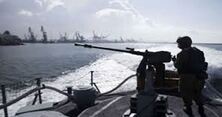
Two Palestinian fishermen were injured at dawn Friday when Israeli naval forces opened fire at their fishing boat in Gaza waters.
The Gazan Fishermen Committee said that Israeli gunboats heavily opened fire at Palestinian fishermen off the shore of Deir al-Balah City in the middle area of the Gaza Strip.
It added that two fishermen suffered minor injuries in the attack.
Meanwhile, local sources told Quds Press that Israeli occupation forces stationed at the border between the Gaza Strip and the 1948 occupied Palestinian territories opened fire at Palestinian farmers working in their lands east of Khan Younis in the southern Gaza Strip.
No injuries were reported.
The Gazan Fishermen Committee said that Israeli gunboats heavily opened fire at Palestinian fishermen off the shore of Deir al-Balah City in the middle area of the Gaza Strip.
It added that two fishermen suffered minor injuries in the attack.
Meanwhile, local sources told Quds Press that Israeli occupation forces stationed at the border between the Gaza Strip and the 1948 occupied Palestinian territories opened fire at Palestinian farmers working in their lands east of Khan Younis in the southern Gaza Strip.
No injuries were reported.
3 oct 2019
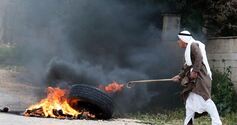
The Israeli occupation forces (IOF) at dawn Wednesday raided different areas in the West Bank.
Local sources said that a fire broke out inside a Palestinian shop after the IOF stormed Ain Sultan refugee camp north of Jericho City amid heavy firing of tear gas bombs.
Dozens of Palestinian youths hurled stones at the IOF soldiers while they were withdrawing from the area.
Meanwhile, the IOF broke into the house of an ex-detainee in Yatta town south of al-Khalil City and wreaked havoc on it.
A Palestinian citizen was arrested by the IOF on his way home in a neighboring area.
Local residents said that Samer Abu Rweish was arrested on al-Shuhadaa Street and moved to an unknown destination.
Local sources said that a fire broke out inside a Palestinian shop after the IOF stormed Ain Sultan refugee camp north of Jericho City amid heavy firing of tear gas bombs.
Dozens of Palestinian youths hurled stones at the IOF soldiers while they were withdrawing from the area.
Meanwhile, the IOF broke into the house of an ex-detainee in Yatta town south of al-Khalil City and wreaked havoc on it.
A Palestinian citizen was arrested by the IOF on his way home in a neighboring area.
Local residents said that Samer Abu Rweish was arrested on al-Shuhadaa Street and moved to an unknown destination.
2 oct 2019
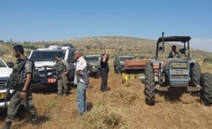
Israeli forces today seized agricultural tools in al-Manshieh village to the southwest of the occupied West Bank city of Bethlehem, according to local sources.
They said Israeli forces seized the tools and ordered a halt on work on farming lands in the village under the pretext that the land is located in Area C, which constitutes about 60 percent of the area of the occupied West Bank and is under full Israeli rule.
They said Israeli forces seized the tools and ordered a halt on work on farming lands in the village under the pretext that the land is located in Area C, which constitutes about 60 percent of the area of the occupied West Bank and is under full Israeli rule.

Israeli soldiers demolished, Wednesday, four sheep pens in the as-Sal’a neighborhood, in Jabal al-Mokabber town, southeast of occupied East Jerusalem.
Eyewitnesses said several army vehicles, including a bulldozer, invaded the neighborhood after surrounded it, and demolished the pens. video video
They added that the demolished structures we installed more than 30 years ago and that the families that owned them did not receive prior notice.
The army said the demolished structures were built without a permit.
Eyewitnesses said several army vehicles, including a bulldozer, invaded the neighborhood after surrounded it, and demolished the pens. video video
They added that the demolished structures we installed more than 30 years ago and that the families that owned them did not receive prior notice.
The army said the demolished structures were built without a permit.
29 sept 2019
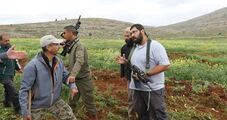
Israeli settlers attacked today Palestinian farmers while working in their own farms near the village of Deir Sharaf, to the west of Nablus City in the northern occupied West Bank, according to local sources.
Ghassan Daghlas, who monitors settlement activities in the area, told WAFA that a group of Israeli settlers chased Palestinian farmers while working in their farms in preparation for the annual olive harvest, in attempt to force them to leave.
He said another group of settlers later broke into the farms and stole a large amount of immature olives before leaving.
Settler violence against Palestinians and their property is routine in the West Bank and is rarely prosecuted by Israeli authorities.
This violence includes property and mosque arsons, stone-throwing, uprooting of crops and olive trees, attacks on vulnerable homes, among others.
Over 600,000 Israelis live in Jewish-only settlements across occupied East Jerusalem and the West Bank in violation of international law.
Ghassan Daghlas, who monitors settlement activities in the area, told WAFA that a group of Israeli settlers chased Palestinian farmers while working in their farms in preparation for the annual olive harvest, in attempt to force them to leave.
He said another group of settlers later broke into the farms and stole a large amount of immature olives before leaving.
Settler violence against Palestinians and their property is routine in the West Bank and is rarely prosecuted by Israeli authorities.
This violence includes property and mosque arsons, stone-throwing, uprooting of crops and olive trees, attacks on vulnerable homes, among others.
Over 600,000 Israelis live in Jewish-only settlements across occupied East Jerusalem and the West Bank in violation of international law.
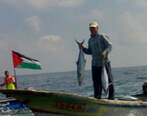
Israeli navy ships fired, on Sunday morning, several rounds of live ammunition at Palestinian fishing boats near the shore of Beit Lahia, in the northern part of the besieged coastal region.
The Palestinian Fishermen’s Syndicate said the Israeli navy fired live rounds at the Palestinian fishing boats while sailing less than three nautical miles from the shore in Beit Lahia.
The attack did not lead to casualties but forced the fishermen back to the shore in fear of further Israeli violations.
The Israeli navy carries out frequent attacks against the fishermen and their boats, leading to dozens of casualties, including fatalities, in addition to abducting many fishermen, damaging and confiscating their boats.
The Palestinian Fishermen’s Syndicate said the Israeli navy fired live rounds at the Palestinian fishing boats while sailing less than three nautical miles from the shore in Beit Lahia.
The attack did not lead to casualties but forced the fishermen back to the shore in fear of further Israeli violations.
The Israeli navy carries out frequent attacks against the fishermen and their boats, leading to dozens of casualties, including fatalities, in addition to abducting many fishermen, damaging and confiscating their boats.
Page: 38 - 37 - 36 - 35 - 34 - 33 - 32 - 31 - 30 - 29 - 28 - 27 - 26 - 25 - 24 - 23 - 22 - 21 - 20 - 19 - 18 - 17
